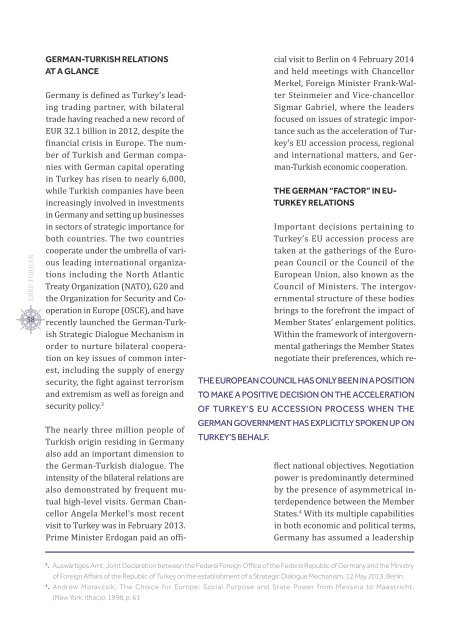Caspian Report - Issue 06 - Winter 2014
You also want an ePaper? Increase the reach of your titles
YUMPU automatically turns print PDFs into web optimized ePapers that Google loves.
EBRU TURHAN<br />
58<br />
GERMAN-TURKISH RELATIONS<br />
AT A GLANCE<br />
Germany is defined as Turkey’s leading<br />
trading partner, with bilateral<br />
trade having reached a new record of<br />
EUR 32.1 billion in 2012, despite the<br />
financial crisis in Europe. The number<br />
of Turkish and German companies<br />
with German capital operating<br />
in Turkey has risen to nearly 6,000,<br />
while Turkish companies have been<br />
increasingly involved in investments<br />
in Germany and setting up businesses<br />
in sectors of strategic importance for<br />
both countries. The two countries<br />
cooperate under the umbrella of various<br />
leading international organizations<br />
including the North Atlantic<br />
Treaty Organization (NATO), G20 and<br />
the Organization for Security and Cooperation<br />
in Europe (OSCE), and have<br />
recently launched the German-Turkish<br />
Strategic Dialogue Mechanism in<br />
order to nurture bilateral cooperation<br />
on key issues of common interest,<br />
including the supply of energy<br />
security, the fight against terrorism<br />
and extremism as well as foreign and<br />
security policy. 3<br />
The nearly three million people of<br />
Turkish origin residing in Germany<br />
also add an important dimension to<br />
the German-Turkish dialogue. The<br />
intensity of the bilateral relations are<br />
also demonstrated by frequent mutual<br />
high-level visits. German Chancellor<br />
Angela Merkel’s most recent<br />
visit to Turkey was in February 2013.<br />
Prime Minister Erdogan paid an official<br />
visit to Berlin on 4 February <strong>2014</strong><br />
and held meetings with Chancellor<br />
Merkel, Foreign Minister Frank-Walter<br />
Steinmeier and Vice-chancellor<br />
Sigmar Gabriel, where the leaders<br />
focused on issues of strategic importance<br />
such as the acceleration of Turkey’s<br />
EU accession process, regional<br />
and international matters, and German-Turkish<br />
economic cooperation.<br />
THE GERMAN “FACTOR” IN EU-<br />
TURKEY RELATIONS<br />
THE EUROPEAN COUNCIL HAS ONLY BEEN IN A POSITION<br />
TO MAKE A POSITIVE DECISION ON THE ACCELERATION<br />
OF TURKEY’S EU ACCESSION PROCESS WHEN THE<br />
GERMAN GOVERNMENT HAS EXPLICITLY SPOKEN UP ON<br />
TURKEY’S BEHALF.<br />
Important decisions pertaining to<br />
Turkey’s EU accession process are<br />
taken at the gatherings of the European<br />
Council or the Council of the<br />
European Union, also known as the<br />
Council of Ministers. The intergovernmental<br />
structure of these bodies<br />
brings to the forefront the impact of<br />
Member States’ enlargement politics.<br />
Within the framework of intergovernmental<br />
gatherings the Member States<br />
negotiate their preferences, which reflect<br />
national objectives. Negotiation<br />
power is predominantly determined<br />
by the presence of asymmetrical interdependence<br />
between the Member<br />
States. 4 With its multiple capabilities<br />
in both economic and political terms,<br />
Germany has assumed a leadership<br />
3<br />
. Auswärtiges Amt, Joint Declaration between the Federal Foreign Office of the Federal Republic of Germany and the Ministry<br />
of Foreign Affairs of the Republic of Turkey on the establishment of a Strategic Dialogue Mechanism, 12 May 2013, Berlin.<br />
4<br />
. Andrew Moravcsik, The Choice for Europe: Social Purpose and State Power from Messina to Maastricht,<br />
(New York: Ithaca), 1998, p. 61










